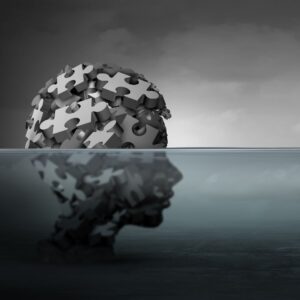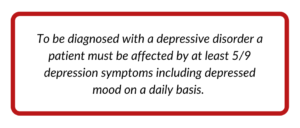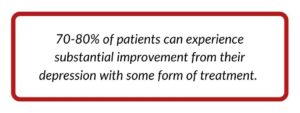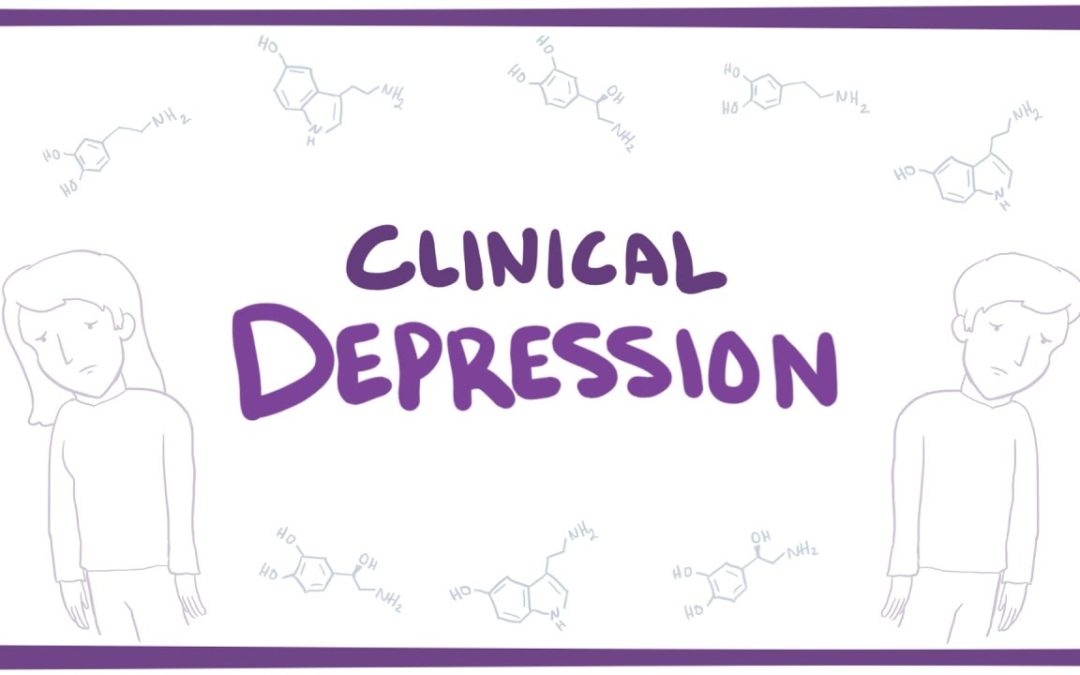In this article:
- The Neurochemistry of Depression
- Which Neurotransmitters Play a Part in Depression?
- Subtypes of Depression
- Non-Pharmacologic Treatment for Depression
- Pharmacologic Depression Treatment
- Help With Clinical Depression
You’ve probably walked out of a movie and commented that some part was “depressing”, but you’ve likely never commented that a film was “clinically depressing.” Clinical depression is a state of a serious mental disorder with a lifetime incidence of up to 20% in women and 12% in men. It is one of the most common reasons people seek care. Although relatively common, it does not make it any less serious. It can substantially affect day-to-day life: working, eating, sleeping, studying, and more. A multitude of factors can cause this state which includes genetics, biological causes, environment, and one’s psychological processing. Those who have a family member with depression can be up to three times more likely to be affected themselves. The link gets stronger the more closely related the relatives are.
The Neurochemistry of Depression
 Biologically, most medications generally work on neurotransmitters serotonin, dopamine, and norepinephrine. Neurotransmitters are basically molecules that assist in sending messages from neuron to neuron, released by one neuron and received by the next. That causes a message to be relayed. Regulation of how many neurotransmitters are present is believed to play a large role in depressive symptoms. It’s been shown that people with family members who have depression are three times more likely to have it themselves. Regulation of how many of these neurotransmitters are being sent between neurons at any given time is believed to be involved in mood as they are involved in various neurological functions such as appetite, sleep, and cognitive function.
Biologically, most medications generally work on neurotransmitters serotonin, dopamine, and norepinephrine. Neurotransmitters are basically molecules that assist in sending messages from neuron to neuron, released by one neuron and received by the next. That causes a message to be relayed. Regulation of how many neurotransmitters are present is believed to play a large role in depressive symptoms. It’s been shown that people with family members who have depression are three times more likely to have it themselves. Regulation of how many of these neurotransmitters are being sent between neurons at any given time is believed to be involved in mood as they are involved in various neurological functions such as appetite, sleep, and cognitive function.
Chemicals Involved in Depression
So, which neurotransmitters play a part in depression? Some of the main neurotransmitters that can affect depression are serotonin, dopamine, and norepinephrine. Antidepressants that allow more of these neurotransmitters to be present in the synaptic cleft, the space between neurons, have been found to be effective, which supports the monoamine-deficiency theory (that low levels of certain neurotransmitters can translate to the development of depression). These neurotransmitters are monoamines as they have one amine group in their molecular structure. More specifically, norepinephrine is believed to have a particular effect on anxiety and attention, serotonin to especially affect obsessions and compulsions, and dopamine to be involved in pleasure, motivation, and engagement. Serotonin especially though, is thought to be a major neurotransmitter that can possibly even regulate the other neurotransmitters. It’s been found when the body cannot make as much serotonin, perhaps in cases like tryptophan depletion (which is the amino acid the body uses to make serotonin), people can start to get symptoms of depression. Although that’s an interesting thought, research is still ongoing as to why certain neurotransmitters may be decreased in depressed patients. Ultimately, the development of depression is complicated, right? Other factors can also be involved such as major stresses and how we each individually cope with what comes our way.
 In order to be diagnosed with a major depressive episode which facilitates the diagnosis of a major depressive disorder, patients must meet certain criteria found in the Diagnostic and Statistical Manual of Mental Disorders, fifth edition. They must be affected by 5/9 symptoms most of the day nearly every day and one must either be depressed mood or diminished interest in activities. Other symptoms include weight gain or loss, insomnia or oversleeping, psychomotor agitation or slowing, fatigue, feelings of excessive worthlessness or guilt, impaired cognition, and recurrent thoughts of death or suicide. There must be substantial impairment or distress in the person’s life. The symptoms can also not be due to a medical condition or substances (intoxication or withdrawal) and must not be able to be better explained by another psychiatric disorder.
In order to be diagnosed with a major depressive episode which facilitates the diagnosis of a major depressive disorder, patients must meet certain criteria found in the Diagnostic and Statistical Manual of Mental Disorders, fifth edition. They must be affected by 5/9 symptoms most of the day nearly every day and one must either be depressed mood or diminished interest in activities. Other symptoms include weight gain or loss, insomnia or oversleeping, psychomotor agitation or slowing, fatigue, feelings of excessive worthlessness or guilt, impaired cognition, and recurrent thoughts of death or suicide. There must be substantial impairment or distress in the person’s life. The symptoms can also not be due to a medical condition or substances (intoxication or withdrawal) and must not be able to be better explained by another psychiatric disorder.
Depression Can be Classified Into Various Subtypes
Postpartum Depression
Postpartum depression occurs after childbirth. However, studies show there often is a history of depressive symptoms prior to delivery and it is now diagnosed as a depressive disorder with peripartum onset. So onset can occur during pregnancy or 4 weeks following delivery. Hormonal changes can play a role, especially in estrogen and progesterone. In addition, abrupt changes in lifestyle can be a factor because this can happen in men as well.
Atypical Depression
Atypical depression is when there is an improved mood when exposed to positive events/activities. This is called mood reactivity. This contrasts with melancholic depression. There can also be increased appetite, excessive sleeping, feeling heavy (also called leaden paralysis), and rejection sensitivity. The last one is feeling anxious at the slightest evidence of rejection. Atypical depression is another important subtype that’s characterized by an improved mood. Another entity is known as persistent depressive disorder, sometimes used to describe milder symptoms of depression that occur over longer periods, 2+ years with two more of the following: appetite disturbance, sleep disturbance, fatigue/low energy, low self-esteem, indecisiveness, and feelings of hopelessness or pessimism. Finally, depressed/low mood is present most of the day for more days than not over this 2+ year timeframe.
With so many factors involved in depression, there can be challenges to treatment. But 70-80% of patients can experience substantial improvement with treatment. It can be grouped into two groups: pharmacologic and non-pharmacologic.
Non-Pharmacologic Treatment for Depression
Depression is a complex mental health disorder that affects millions of people around the world. While medication can be an effective treatment option, it’s not always the best option for everyone. In fact, many people with depression are turning to non-pharmacologic depression treatments as a way to manage their symptoms and improve their overall mental health. These non-pharmacologic treatments can include a wide range of approaches, such as therapy, lifestyle changes, and alternative therapies. Some non-pharmacologic treatment options include:
- Many studies have supported the robust benefits of physical activity. Especially spending at least 90 minutes a week at 70-85% of the heart rate reserve (HRR). Endorphins, neurotransmitters, and endocannabinoids are released. In addition, body temperature is raised and tense muscles are relaxed.
- Dietary changes can help. There is no silver bullet to food though. But more fruits and vegetables help us have balanced nutrition, promote healthy gut bacteria and allow us to get the nutrients needed to make these neurotransmitters and other compounds which promote neurologic health.
- Psychotherapy, especially modalities such as cognitive behavioral therapy, interpersonal therapy, and dialectical behavioral therapy are proven to be effective. They actually promote therapeutic connections in our neuronal networks and some studies have found they even promoted neurogenesis.
 Pharmacologic Treatment for Depression
Pharmacologic Treatment for Depression
In cases of severe or more persistent depressive symptoms, medication may be indicated. The most commonly prescribed forms are selective serotonin reuptake inhibitors or SSRIs. In the synaptic cleft, after neurotransmitters are released, they get reabsorbed, SSRIs block their reuptake allowing them to facilitate more communication between neurons. Other medication classes include tricyclics and monoamine oxidase inhibitors (MAOIs). The MAOIs are still touted as some of the most effective medications for depressive disorders. But the most effective treatment continues to be electroconvulsive therapy (ECT). Especially for very stubborn cases of depression or severe depression (e.g. psychotic depression, imminent suicidality, and catatonic depression). A small amount of electric current is passed through the brain while patients are under general anesthesia and a brief (~1 minute) seizure is induced. ECT has been used for decades and is effective in achieving remission in as many as 50%, sometimes 85% of patients. But the reason why induced seizures seem to improve symptoms is not well understood.
Additional Help With Clinical Depression
Clinical depression is tough. Both for those experiencing it and the individuals surrounding them. Unlike many other illnesses, mental illness, unfortunately, continues to carry a stigma, leading to judgment which can leave a depressed person feeling even worse. Social support is absolutely necessary and leads to better outcomes.
If you’re struggling with clinical depression, help is available. Contact our compassionate team of psychiatrists, psychologists, and psychotherapists near you in Milwaukee, WI to learn more about depression treatment near Milwaukee.

